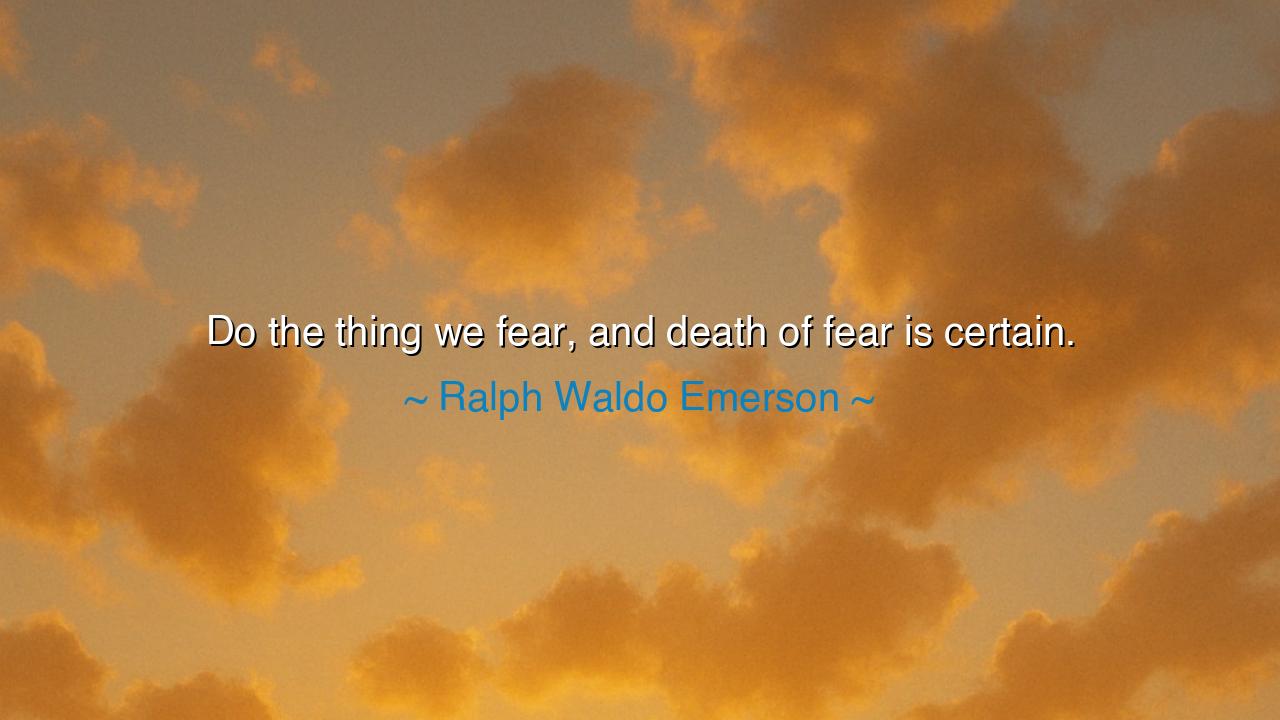
Do the thing we fear, and death of fear is certain.






Ralph Waldo Emerson once declared: “Do the thing we fear, and death of fear is certain.” In these few words, he reveals one of the oldest and most profound truths of the human spirit — that courage is not the absence of fear, but the mastery of it. Emerson, the sage of American transcendentalism, speaks here not as a philosopher removed from the struggles of life, but as one who understood that fear, if left unconfronted, becomes a tyrant of the soul. His words are a call to action, a command to the heart: that the only way to end fear is to face it, to walk through its shadow until the shadow itself dissolves.
The origin of this quote lies in Emerson’s lifelong exploration of the human will and its divine potential. Living in a young nation struggling to define its own identity, he became the voice of individual strength and moral independence. His essays and lectures urged people to trust their inner voice — to look within rather than to authority or tradition. To Emerson, the greatest chains were not forged by kings or institutions, but by our own doubts. Fear, he said, was the great thief of destiny. And the only way to conquer it was not to reason it away or flee from it, but to act despite it — for through action, the illusion of fear dies, and the truth of our strength is revealed.
“Do the thing we fear.” These words strike like a hammer upon the heart, for they expose the falsehood that fear is an external force. Fear does not live in the world — it lives in us. It is born of imagination, nurtured by hesitation, and fed by the refusal to act. But once we do the thing itself — once we step into the darkness — fear is undone, because it cannot survive contact with reality. Fear is a ghost; action is the sunrise that makes it vanish. The ancients understood this well. The Stoics, from Marcus Aurelius to Seneca, taught that fortune favors the brave, and that virtue lies not in safety, but in courage. Emerson, inheriting that wisdom, gave it new life in his age: by doing what terrifies us, we reclaim our power.
History gives us countless witnesses to this truth. Consider Rosa Parks, who, with a single act of quiet defiance, faced not only personal fear but the weight of an unjust system. When she refused to give up her seat on that Montgomery bus, she was surely afraid — but she did the thing she feared. And in that moment, the death of fear began — not only for her, but for millions who followed. Her courage ignited a movement, proving Emerson’s eternal point: that fear dies when we act; that freedom, personal or collective, is born from the confrontation of what we dread most.
Emerson’s words also remind us that growth demands discomfort. Every soul, he says, is called to step beyond the boundaries of its own safety. The warrior does not become strong by avoiding battle; the mind does not become wise by avoiding doubt. Fear is the gatekeeper of transformation. To pass through it is to awaken the dormant parts of ourselves — the will, the faith, the divine spark of resilience that lies hidden beneath hesitation. The moment we act, the moment we take the first step toward what we fear, something sacred occurs: we discover that the danger was never as vast as the mind had imagined, and that we ourselves are greater than we knew.
In this way, Emerson’s teaching is not a promise of ease, but a call to courage. He does not say that fear disappears before action, but that it dies because of action. This distinction is vital, for it teaches us that bravery is born in motion, not in certainty. We cannot think our way into courage; we must live our way into it. The storm does not end because we wait — it ends because we walk through it. And when we do, when we look back from the far shore, we find that the monster we fled was only our own shadow, and that fear’s power was borrowed entirely from our surrender.
Let this, then, be the lesson: do not wait for fear to fade before you act — act, and it will fade. Whatever it is that haunts your heart — the fear of failure, of rejection, of loss, of change — face it. Speak when silence feels safe. Try when failure feels certain. Love when vulnerability feels dangerous. Each act of courage is a small death — the death of fear, and the birth of strength. In time, as Emerson promised, the “death of fear is certain,” for fear cannot survive in the presence of a will that dares.
So go forth, as the ancients would say, with the heart of a hero. Remember Emerson’s wisdom: the only way out of fear is through it. Step boldly into the unknown, for every act of courage enlarges the soul and every conquered fear becomes the foundation of freedom. In the end, it is not fear that defines us, but the fire that overcomes it — and through that fire, we rise, renewed, fearless, and free.






AAdministratorAdministrator
Welcome, honored guests. Please leave a comment, we will respond soon